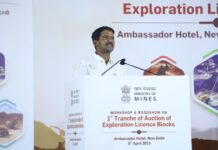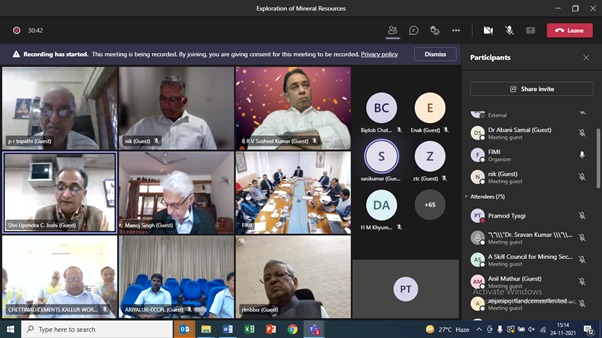By Our Correspondent
NEW DELHI/BHUBANESWAR: The Federation of Indian Mineral Industries (FIMI), the apex body of Indian Mining Industry, on Wednesday hosted a National Seminar on “ Exploration of Mineral Resources” through virtual format. FIMI National President, Rajiv Lochan Mohanty given the welcome address and highlighted difficulties faced by Mining Companies.
Dr. V.K. Saraswat, Member, NITI Aayog, Upendra Joshi, Joint Secretary to the Government of India, Ministry of Mines, Pradeep Singh, Director (Technical), Ministry of Mines, Shantesh Gureddi, Vice President, FIMI and R.K. Sharma, Secretary General, FIMI joined the discussion.
To promote resource development and make auction regime more attractive, Government of India has of late taken several steps to attract investment in mining. The amendments in MMDR Act, 1957 in March, 2021 have simplified exploration regime by offering Composite Licences at G4 level and allowed to some extent the private sector to undertake exploration. This will no doubt increase the resource base and lead to enhanced production of minerals, particularly surficial ones like limestone, bauxite, iron ore, etc. which are necessary for continued growth of the national economy, FIMI President Mohanty said.
Our country is supposed to be endowed with huge resources of various minerals and favourable geological milieu. Obvious geological potential (OGP) areas have been established to the extent of 6.88 lakh sq. km. out of the country’s geographical area of 32.87 lakh sq. km. Most of the OGP areas are accounted for by deep seated and high-value minerals : diamond and precious stones account for 3.55 lakh sq. km., followed by base metals 1.92 lakh sq. km and gold 1.44 lakh sq. km. These are the minerals / metals for which India is dependent either wholly or substantially on imports, he added.
Unfortunately, the focus so far has been on surficial and easy-to-mine minerals which contribute 95% of the total mineral production, balance being deep-seated minerals. Most of the discoveries in India have been chance discoveries or based on old workings. These include lead and zinc in Udaipur, chromite in Sukinda, copper in Malanjkhand, gold in Hutti and Bharat Gold mines in Karnataka, etc. Because of the unhelpful exploration policy, and being limited to GSI / MECL, the focus has been on surficial deposits such as iron ore, bauxite, limestone, manganese ore, chromite, etc. There has not been enough focus on deep-seated minerals which has resulted in more imports of these minerals / metals. This Webinar is to address this serious gap in exploration of deep-seated mineral resources, Mohanty said.
All over the world, prospecting and mining are recognised as an independent activity with transferability of the concessions. By and large, 1almost the resource-rich countries have adopted the system of first-come-first- served (FCFS) for the resource development. Under the FCFS system, an agreement is entered with the Government with full checks and balances whereby there is annual financial / expenditure commitment (which differs from country to country) by the concessionaire to undertake minimum committed level of work, which normally goes on increasing every year, FIMI President said.
Normally the success rate of prospects in exploration is 1:100. As such, no resource rich country spends tax payers’ money on such a risky venture. For undertaking exploration job, these countries entrust the same to private companies, popularly known as junior exploration companies. A junior exploration company is formed by a group of geologists whose domain expertise is in a particular mineral or a group of minerals which again depends on the global demand and price of a metal and effective tax rate in the host country. For exploration expenditure, they bank on venture capital or hedge funds.
A junior exploration company, when it is successful in locating a world class discovery, sells it to a major mining company at a price which may recover its past losses, if any, and may possibly cover future losses. A mining company can also undertake exploration such as Rio Tinto which discovered the diamond deposit in Bunder area in Madhya Pradesh. Both the junior exploration companies as well as mining companies have freedom to sell / transfer the concessions with its tenurial guarantee and seamless transition to mining, all of which are key to success of FCFS system.
This Webinar is to generate interest whether the present system of “auction” will be able to attract exploration expenditure or the Government of India has to revisit the area to promote exploration for deep-seated minerals to make India Atmanirbhar and secure it against external exigencies.
“I strongly believe this online event will deliberate the challenges and opportunities and come out with appropriate recommendations with special focus on exploration of deep-seated and high-value minerals along with private sector’s role in tapping exploration potential of India.With these words, I once again welcome you all to the online event on “Exploration of Mineral Resources” and wish all the very best,” he added.

















![Solila Parida : Odisha’s Forgotten Cinema Producer [1939-2025]](https://indianewsdiary.com/wp-content/uploads/2025/04/Solila-Parida-Odishas-Forgotten-Cinema-Producer--100x70.jpeg)












